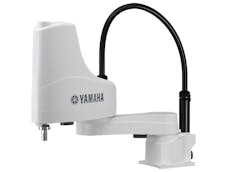Yamaha Seeks to Change the Economics of Automation
Fully automating a manufacturing facility may be technically feasible, but it can also be very expensive. If production volumes or the unit price of the produced items is low, the projected return on investment for automation may not make sense for the company.
To help smaller and mid-sized companies deploy robotics, Yamaha offers its YK-XE series SCARA robots, the RCXiVY2+ vision system and YRG series electric grippers.
Yamaha recently helped a customer producing injection-molded components for industrial applications overcome a quality-control issue. Using the SCARA robot, vision system and gripper noted above, inspectors could better detect molding defects and accurately trace the cause. In addition to improving quality, the robot also helped increase the company’s production rate.
The quality control problem at the injection molding company stemmed from the fact that a single human operator had been responsible for inspecting and packing items produced by a molding machine with multiple molding cavities. Before adding the Yamaha robot technologies, the company used one robot to remove items from the machine and place them on a conveyor. The conveyor then dropped all the moldings into a box, from which the operator picks one at a time for inspection and palletizing.
With this process, it was difficult for the operator to connect any recurring defects back to the originating cavity in the molding machine. This created the potential for large numbers of faulty units to be produced before the cause was identified.
Improving quality control required identifying the individual molding cavity from which any defective part originated. This was beyond the capabilities of a lone operator, who was under pressure to pick and pack the items at a speed compatible with the production rate. The company considered inspecting each molding as it was ejected from its cavity before being placed on the conveyor. However, this would require multiple inspectors, adding to the overall manufacturing costs.
Yamaha’s YK-XE SCARA robot enables items to be palletized at high speed, picking directly from the conveyor. This also allowed them to remain in the same order in which they emerged from molding machine. As a result, any item inspected and found to be faulty could be directly linked to the originating cavity.
The integrated RCXiVY2+ vision system tracks the position and orientation of up to 100 items traveling on the conveyor to help the robot pick and palletize each molding quickly and accurately.
Management of the camera and vision processing is integrated within the Yamaha RCX340 controller, which also hosts the robot application. The camera can be attached to the robot or mounted on a separate fixture. Yamaha’s system has dedicated vision instructions to simplify programming. A dedicated bus line in the system allows for high data speeds, thereby avoiding the latency that can impair the performance of robotic vision systems.
Yamaha’s YK-XE SCARA series comprises robots rated for payloads up to 10kg and offers a choice of arm lengths from 400mm to 710mm. Wiring and pneumatic tubing for controlling end effectors can be routed through-shaft and through-cap to protect against breakage and disconnection. Arm acceleration and deceleration are automatically optimized according to the payload weight to ensure maximum speed and prevent vibration for improved accuracy.

